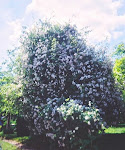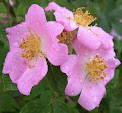Poor Forbes Watson! During his final illness and before dying in agony aged 29 he comforted himself by writing about flowers and gardens. Then he gave the manuscript to a friend for posthumous publication. This slight work on aesthetics ("Flowers and Gardens") would be completely forgotten had it not formed a link in the chain between John Ruskin and William Robinson and inspired the "natural gardeners" who later turned Victorian formal gardening on its head. Drawing on Ruskin's principles of art and aesthetics, he was the first to rebel against carpet bedding and Victorian formalism.
There is a saying "beauty is in the eye of the beholder". Forbes Watson believed the opposite. For him beauty was an objective, almost tangible quality, that God had placed in all flowers, like mass and density, for the observer to find, like some divine Easter egg hunt. Being devoutly religious the door to beauty through function, that Darwin had opened, was closed to him. He considered not the aesthetics of the bee. Whereas Darwin's beauty opened the human spirit to gigantic and majestic vistas, Forbes Watson's beauty came from sentimentality and the supernatural.
Canon Ellacombe described him thus:
"a man of unblemished character and pure life; an intense lover of truth, wherever he could find it, and a hater of shams and falsehoods of every sort; a warm friend, especially to the poor, to whom he was most liberal, even with limited means, and a labourer among them, teaching the boys, and sparing no labour to help them in leading good lives; a deeply religious man, to whom his religion was part of his life, and a very strong Noncomformist"
Roses were a particular problem to him, because he loved the double roses that man had created, the "deep warm bosom" of the cabbage rose and the moss, but were these roses of Man's creation better that the wild briars of God's? Heaven forbid! Imagining a stubborn interlocutor, he wrote:
'"But study the single rose as I may", you perhaps tell me, "I cannot like it much after the double one. I think it wants body, it seems loose and weak, and I really care little for it…these little points you mention, the stamens and the pistils, never enter my head for a moment; and I do not feel the want of them, they are wholly forgotten in that luxuriant fullness of beauty…"The one thing really proved is this, that your taste is most seriously injured….though in turning to the Garden Rose I cannot feel it faulty any more than you do, I soon find that I miss something there; that is, I should soon be wearied if I had none but such Roses as these, and was absolutely debarred from the complete wild ones. And do you not see the reason of this, viz., that the beauties of the cultivated Rose are more especially of that sensuous striking kind which can hardly be overlooked, and are apt to veil in their blaze the simpler and less obtrusive, though more deeply satisfying, charms of the Wild Rose?'
Amen to that?


No comments:
Post a Comment